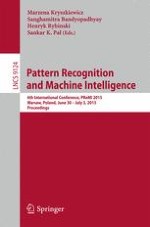2015 | OriginalPaper | Buchkapitel
Concept Synthesis Using Logic of Prototypes and Counterexamples: A Graded Consequence Approach
verfasst von : Soma Dutta, Piotr Wasilewski
Erschienen in: Pattern Recognition and Machine Intelligence
Aktivieren Sie unsere intelligente Suche, um passende Fachinhalte oder Patente zu finden.
Wählen Sie Textabschnitte aus um mit Künstlicher Intelligenz passenden Patente zu finden. powered by
Markieren Sie Textabschnitte, um KI-gestützt weitere passende Inhalte zu finden. powered by
